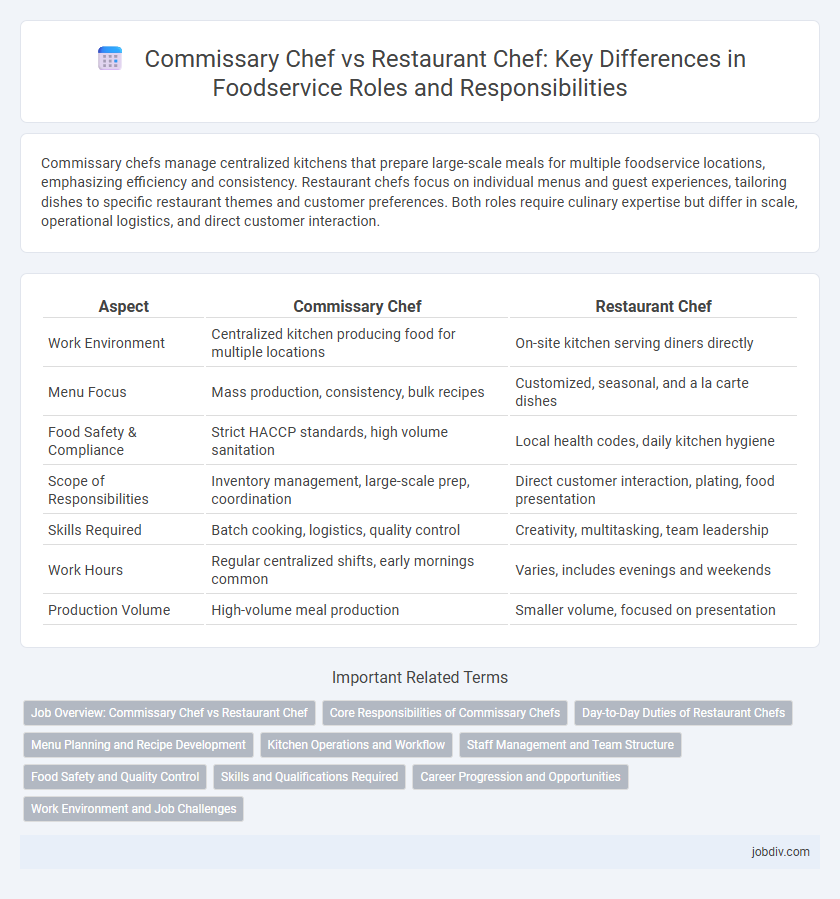Commissary chefs manage centralized kitchens that prepare large-scale meals for multiple foodservice locations, emphasizing efficiency and consistency. Restaurant chefs focus on individual menus and guest experiences, tailoring dishes to specific restaurant themes and customer preferences. Both roles require culinary expertise but differ in scale, operational logistics, and direct customer interaction.
Table of Comparison
| Aspect | Commissary Chef | Restaurant Chef |
|---|---|---|
| Work Environment | Centralized kitchen producing food for multiple locations | On-site kitchen serving diners directly |
| Menu Focus | Mass production, consistency, bulk recipes | Customized, seasonal, and a la carte dishes |
| Food Safety & Compliance | Strict HACCP standards, high volume sanitation | Local health codes, daily kitchen hygiene |
| Scope of Responsibilities | Inventory management, large-scale prep, coordination | Direct customer interaction, plating, food presentation |
| Skills Required | Batch cooking, logistics, quality control | Creativity, multitasking, team leadership |
| Work Hours | Regular centralized shifts, early mornings common | Varies, includes evenings and weekends |
| Production Volume | High-volume meal production | Smaller volume, focused on presentation |
Job Overview: Commissary Chef vs Restaurant Chef
Commissary chefs oversee large-scale food production in centralized kitchens, focusing on batch preparation, menu standardization, and food safety compliance to supply multiple outlets or catering events. Restaurant chefs manage daily kitchen operations in individual establishments, emphasizing menu creativity, plating, and direct interaction with front-of-house staff to ensure customer satisfaction. Both roles require leadership and culinary expertise but differ in scale, operational priorities, and end-user engagement within the foodservice industry.
Core Responsibilities of Commissary Chefs
Commissary chefs specialize in large-scale food production, overseeing the preparation and distribution of meals to multiple foodservice outlets. They focus on menu planning, inventory management, and maintaining strict food safety standards to ensure consistent quality across all locations. Their core responsibilities also include coordinating with suppliers, optimizing kitchen workflows, and training kitchen staff to uphold efficient operations.
Day-to-Day Duties of Restaurant Chefs
Restaurant chefs manage daily kitchen operations, including menu planning, ingredient preparation, and ensuring food quality meets customer expectations. They coordinate with front-of-house staff to maintain smooth service and handle inventory control to minimize waste. Their role demands constant attention to food presentation, cooking times, and compliance with health and safety standards.
Menu Planning and Recipe Development
Commissary chefs specialize in large-scale menu planning and recipe development, focusing on standardized, cost-effective dishes suitable for mass production across multiple foodservice locations. Restaurant chefs prioritize customized recipes and seasonal menu planning, emphasizing creativity and presentation tailored to the local customer base. Efficient inventory management and ingredient consistency are critical in commissary settings, while restaurant chefs often adapt recipes based on immediate availability and guest preferences.
Kitchen Operations and Workflow
Commissary chefs oversee large-scale kitchen operations, managing bulk food preparation and ensuring consistent quality across multiple foodservice outlets, which streamlines workflow and reduces costs. Restaurant chefs focus on immediate, on-site cooking, emphasizing creativity and customization in a fast-paced environment that demands quick decision-making and adaptation. Both roles require precise coordination, but commissary chefs optimize efficiency through centralized production while restaurant chefs adapt dynamically to customer demands.
Staff Management and Team Structure
Commissary chefs oversee large-scale food production teams, managing staff across centralized kitchens to ensure consistent quality and efficiency for multiple outlets. Restaurant chefs lead smaller, specialized kitchen teams, focusing on daily service coordination and direct supervision of cooks and servers. Effective staff management in commissaries involves streamlined workflows and standardized training, while restaurant chefs emphasize real-time team communication and adaptability.
Food Safety and Quality Control
Commissary chefs oversee large-scale food production with stringent food safety protocols, ensuring standardized quality control across multiple outlets. Restaurant chefs focus on individual dish preparation, maintaining quality and freshness through direct supervision of kitchen operations. Emphasizing HACCP compliance and consistent sanitation practices is critical for both roles to prevent contamination and uphold food safety standards.
Skills and Qualifications Required
Commissary chefs require expertise in large-scale menu planning, inventory management, and food safety compliance to efficiently prepare bulk meals for multiple outlets. Restaurant chefs prioritize culinary creativity, plating skills, and direct interaction with guests, necessitating experience in kitchen leadership and real-time problem solving. Both roles demand strong organizational abilities, culinary certifications such as ServSafe, and proficiency in managing kitchen staff, but commissary chefs focus more on operational efficiency while restaurant chefs emphasize culinary presentation.
Career Progression and Opportunities
Commissary chefs often advance by managing large-scale food production and streamlining operations for multiple outlets, gaining skills in inventory control and logistics crucial for corporate culinary roles. Restaurant chefs typically progress through kitchen hierarchy by honing creativity and leadership in a single-location environment, which can lead to executive chef positions or owning a restaurant. Both paths offer distinct career opportunities, with commissary roles emphasizing scalability and efficiency, while restaurant chefs focus on menu innovation and direct customer experience.
Work Environment and Job Challenges
Commissary chefs operate in centralized kitchens, managing large-scale meal production with a focus on efficiency and consistency to supply multiple foodservice locations. Restaurant chefs work in dynamic dining environments, balancing creativity and customer interaction while managing in-house kitchen staff and fluctuating service demands. Both roles face challenges such as maintaining food quality, meeting strict deadlines, and ensuring compliance with health and safety regulations but differ in scale and operational complexity.
Commissary Chef vs Restaurant Chef Infographic

 jobdiv.com
jobdiv.com